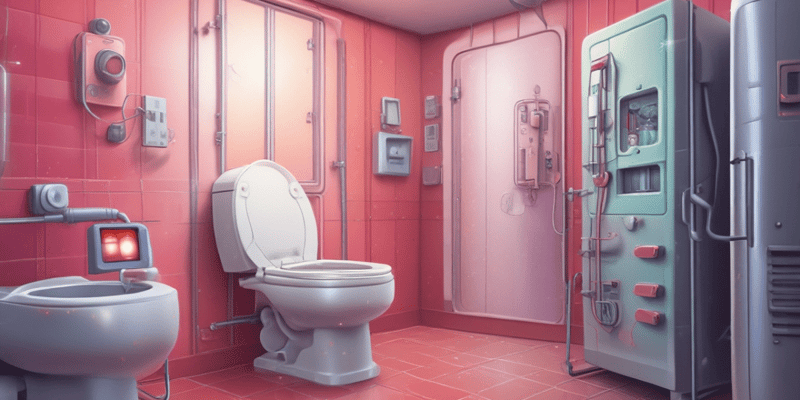Questions and Answers
What is the primary reason for empiric therapy in treating UTIs?
To target the most probable pathogens
What is a critical consideration when transporting urine specimens to the laboratory?
Refrigerating the specimen within 1-2 hours
What is a common challenge in patient management of UTIs?
Patient management is becoming more difficult due to increasing resistance to oral 1st line agents
What is a treatment option for pyelonephritis?
Signup and view all the answers
What is a consideration when treating complicated UTIs?
Signup and view all the answers
Why should urines received within 24 hours be refrigerated?
Signup and view all the answers
What is the primary focus of dipstick testing in urinalysis?
Signup and view all the answers
What is the definition of significant bacteriuria in urine culture?
Signup and view all the answers
What is the most frequently used method for collecting urine specimens?
Signup and view all the answers
What is the significance of detecting nitrites in urinalysis?
Signup and view all the answers
What is the importance of collecting a mid-stream urine specimen?
Signup and view all the answers
How is a urine specimen typically obtained from an indwelling catheter?
Signup and view all the answers
What is the significance of detecting leukocytes in urinalysis?
Signup and view all the answers
What is the significance of combining detection of nitrites and leukocytes in urinalysis?
Signup and view all the answers
What is a characteristic of uncomplicated UTIs?
Signup and view all the answers
What is the term for a collection of pus in the kidney or in the soft tissue surrounding the kidney?
Signup and view all the answers
What is a factor that predisposes a patient to complicated UTIs?
Signup and view all the answers
What is the term for the recurrence of infection by the same organism after discontinuation of treatment?
Signup and view all the answers
Which of the following patients is at higher risk for complicated UTIs?
Signup and view all the answers
What is a characteristic of complicated infections?
Signup and view all the answers
Study Notes
Specimen Transport
- Specimens must be sent to the lab and processed as quickly as possible
- Required information: method of collection, time and date of collection
- Specimens not received by the lab within 1-2 hours must be refrigerated
- Urine specimens not received within 24 hours or not refrigerated will be rejected by the laboratory, unless transported in a Boric acid tube
Urinary Tract Infections (UTIs)
- Not all patients with suspected UTI need to be cultured
- Empiric therapy is based on the most probable pathogens, type of infection (lower or upper tract), local rates of resistance, and whether it's an acute or recurrent infection
Typical Treatment Regimens
- Uncomplicated cystitis: Nitrofurantoin, Fosfomycin, TMP/SMX (if resistance < 25%), Doxycycline (2nd line), Ciprofloxacin / norfloxacin (2nd line)
- Pyelonephritis: β-lactam + aminoglycoside or Ciprofloxacin / levofloxacin
UTI Definitions
- Prostatitis: inflammation/infection of the prostate gland, may present as acute or chronic
- Intrarenal abscess/perinephric abscess: collection of pus in the kidney or surrounding soft tissue
Uncomplicated vs. Complicated UTIs
- Uncomplicated UTIs: occur in patients with normal genitourinary tracts, typically in non-pregnant premenopausal women
- Complicated UTIs: involve structural or functional abnormality of the genitourinary tract, pregnant women, elderly, men, children, chronic symptoms, comorbid illness, or immunocompromised patients
Complicated Infections
- Underlying abnormality that predisposes patients to UTI or makes treatment more difficult
Recurrent Infections
- Relapse: recurrence of infection by the same organism after discontinuation of treatment (possibly due to resistance)
- Re-infection: recurrence of infection by a different organism after discontinuation of treatment
Diagnosis: Rapid In-office Lab Testing
- Urinalysis by dipstick testing: detects nitrites and leukocytes, which are markers of infection
- Nitrite detection is reasonably sensitive for gram-negative bacteria, but highly specific
- Leukocyte detection is sensitive but not specific
- Combined detection of nitrites and leukocytes is highly sensitive and specific when combined with clinical findings
- Red blood cell detection is not sensitive or specific
Quantitative Culture
- Urine culture: significant bacteriuria is defined as > 105 bacteria / ml (or 10^8 / litre)
- Lower numbers may be significant in children and in catheter-collected specimens
Specimen Collection
- Clean catch mid-stream specimens: most frequently used method, urethra is cleaned prior to collection, first void urine is allowed to pass to clear the urethra
- Collection bags (children): used in young children lacking bladder control, often contaminated, and most meaningful result is a negative culture
- Indwelling catheters: urine obtained by inserting a needle into the catheter or through the diaphragm, preferably obtained from a new catheter rather than an old one
- Suprapubic aspiration / straight catheters: invasive, specimen obtained directly from the bladder
Studying That Suits You
Use AI to generate personalized quizzes and flashcards to suit your learning preferences.
Description
Assess your knowledge of UTIs, from empiric therapy to transportation of urine specimens, and patient management considerations. Test your understanding of treatment options and lab procedures.




